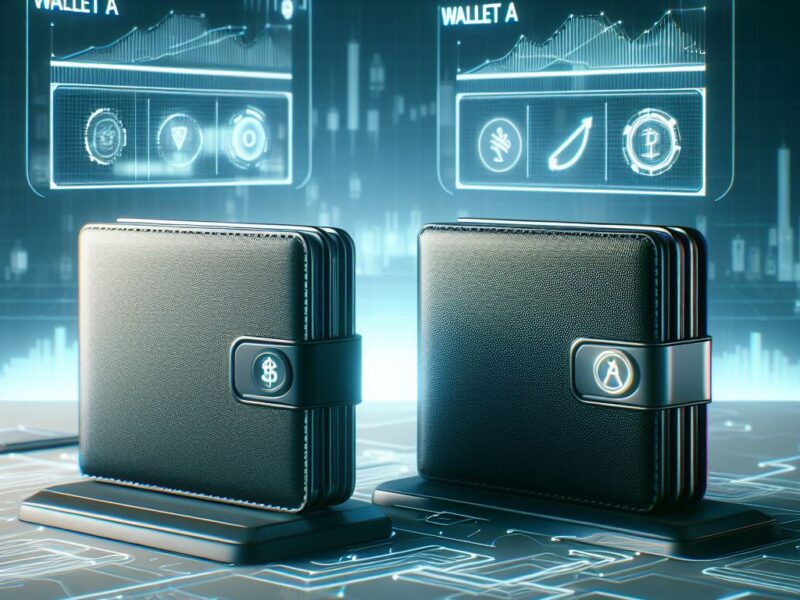In cryptocurrency, storing and securing your digital assets is of utmost importance. This is where hardware crypto wallets come into play.
What is a Hardware Crypto Wallet?
A hardware wallet is a physical device designed specifically to store your cryptocurrency private keys securely. Unlike software wallets that are vulnerable to hacking attempts and malware, hardware wallets keep your private keys offline, making them virtually immune to online threats.
When you want to make a transaction, you connect your hardware wallet to your computer, enter your PIN, and confirm the transaction on the device itself. This process ensures that your private keys never leave the secure environment of the hardware wallet, adding an extra layer of security to your funds.
The best hardware crypto wallets available today.
1. Ledger Nano X
The Ledger Nano X is a popular choice among cryptocurrency enthusiasts, and for good reason. This sleek and compact device supports over 1,500 cryptocurrencies, including major players like Bitcoin, Ethereum, and Litecoin. The Nano X features a secure element chip that protects your private keys from unauthorized access, even if your device is compromised.
Best Crypto Arbitrage Scanners In 2024
One of the standout features of the Ledger Nano X is its Bluetooth connectivity, which allows you to manage your cryptocurrencies on the go using the Ledger Live mobile app. The device has a larger screen compared to its predecessor, the Ledger Nano S, making it easier to use and confirm transactions.
2. Trezor Model T
The Trezor Model T is another top contender in the hardware wallet market. Developed by SatoshiLabs, this device offers a user-friendly interface and supports over 1,000 cryptocurrencies. The Model T features a full-color touchscreen, making it easy to use and confirm transactions without the need for additional buttons.
Security-wise, it employs a secure element chip and a randomized PIN layout to protect against physical tampering and keyloggers. Additionally, the device offers optional passphrase protection thereby keeping your funds secured.
3. KeepKey
KeepKey is a visually striking hardware wallet that prioritizes simplicity and ease of use. With support for over 40 cryptocurrencies, including Bitcoin, Ethereum, and Litecoin, KeepKey is another solid choice for those looking to secure their digital assets.
The device features a large, easy-to-read display and a simple one-button interface, making it accessible even for those new to hardware wallets. KeepKey also integrates with the ShapeShift platform, allowing you to exchange cryptocurrencies directly from your device.
4. ColdCard Mk3
The ColdCard Mk3 is a hardware wallet that is designed specifically for Bitcoin enthusiasts. Developed by Coinkite, this device is known for its advanced security features and open-source firmware. The ColdCard Mk3 is completely air-gapped, meaning it never needs to be connected to a computer to sign transactions, reducing the risk of exposure to potential threats.
One of the unique features of the ColdCard Mk3 is its secure microSD card slot, which allows you to store encrypted backups of your wallet and transfer unsigned transactions. The device also supports multisig setups, all to ensure security for your Bitcoin holdings.
5. BitBox02
The BitBox02 is a sleek and compact hardware wallet developed by Shift Crypto, a Swiss-based company. This device supports a wide range of cryptocurrencies, including Bitcoin, Ethereum, Litecoin, and ERC-20 tokens. The BitBox02 features a minimalist design with a touch slider for intuitive navigation and transaction confirmation.
Security-wise, the BitBox02 employs a dual-chip design, with a secure element chip handling private key storage and a general-purpose chip for the user interface. The device also offers optional password protection and a backup system that splits your recovery phrase into two parts for added security.
Factors to Consider When Choosing a Hardware Wallet
- Supported Cryptocurrencies: Make sure the wallet supports the cryptocurrencies you want to store. While most wallets support popular currencies like Bitcoin and Ethereum, support for lesser-known altcoins may vary.
- Security Features: Look for wallets with robust security features, such as secure element chips, PIN protection, and passphrase support. Consider whether the device has been independently audited for security vulnerabilities.
- Ease of Use: Choose a wallet with a user-friendly interface, especially if you’re new to cryptocurrency. Clear displays, intuitive navigation, and easy backup processes can make a big difference in your overall experience.
- Reputation and Community Support: Go for wallets from reputable companies with a strong track record in the industry. An active community and responsive customer support can be invaluable if you encounter any issues or have questions.
- Price: Hardware wallets range in price from around $50 to $200. While it’s important to invest in security, make sure to consider your budget and the features you need.
Investing in a hardware crypto wallet is a wise decision for anyone serious about securing their digital assets.
Key Takeaways
- Hardware crypto wallets are physical devices designed to securely store your cryptocurrency private keys offline, protecting them from online threats and unauthorized access.
- The Ledger Nano X is a popular choice, supporting over 1,500 cryptocurrencies and featuring Bluetooth connectivity for mobile management.
- The Trezor Model T offers a user-friendly interface with a full-color touchscreen and supports over 1,000 cryptocurrencies.
- KeepKey prioritizes simplicity with a large display and one-button interface, supporting over 40 cryptocurrencies and integrating with the ShapeShift platform.
- The ColdCard Mk3 is tailored for Bitcoin enthusiasts, offering advanced security features like air-gapped signing and a secure microSD card slot for encrypted backups.
- The BitBox02, developed by a Swiss-based company, supports a wide range of cryptocurrencies and features a dual-chip design for enhanced security.
- When choosing a hardware wallet, consider factors such as supported cryptocurrencies, security features, ease of use, reputation, community support, and price.
- Hardware wallets provide a strong foundation for securing digital assets, but it’s still essential to follow best practices like keeping your recovery phrase safe, using strong PINs, and regularly updating firmware.
- The best hardware wallet for an individual depends on their specific needs, preferences, and the cryptocurrencies they hold.
- By combining the use of a hardware wallet with good security habits, cryptocurrency investors can significantly reduce the risk of theft or unauthorized access to their digital assets.
Frequently Asked Questions
1. Are hardware wallets completely immune to hacking attempts?
Hardware wallets provide a high level of security by storing private keys offline, but no device is completely immune to all threats. However, hardware wallets significantly reduce the risk of hacking compared to software wallets or storing cryptocurrencies on exchanges. It’s crucial to purchase hardware wallets from reputable vendors and follow best security practices to minimize any potential vulnerabilities.
2. Can I store multiple cryptocurrencies on a single hardware wallet?
Yes, most hardware wallets support multiple cryptocurrencies. The exact number and types of supported currencies vary by device, so it’s essential to check the specifications before making a purchase. Keep in mind that some wallets may have limited storage capacity, so if you hold a large number of different cryptocurrencies, you may need to use multiple wallets.
3. What happens if I lose my hardware wallet or it gets damaged?
If your hardware wallet is lost or damaged, you can recover your cryptocurrencies using your recovery phrase (also known as a seed phrase or mnemonic phrase). This phrase, typically consisting of 12 to 24 words, is generated when you first set up your wallet and acts as a backup for your private keys. It’s crucial to keep your recovery phrase secure and never share it with anyone, as anyone with access to it can restore your wallet and access your funds.
4. Can I use my hardware wallet with different computers or devices?
Yes, you can use your hardware wallet with different computers or devices, as long as they are compatible with the wallet’s software and have a USB port (or Bluetooth connectivity, in the case of the Ledger Nano X). This flexibility allows you to manage your cryptocurrencies on the go or from multiple devices while maintaining the security of your private keys.
5. How do I update the firmware on my hardware wallet?
Updating the firmware on your hardware wallet is essential to ensure you have the latest security features and bug fixes. The process for updating firmware varies by device, but generally involves connecting your wallet to a computer, opening the associated software (such as Ledger Live or Trezor Suite), and following the prompts to download and install the latest firmware. Always make sure to download firmware updates directly from the official manufacturer’s website to avoid potential security risks.
6. Can I use my hardware wallet to stake cryptocurrencies or earn interest?
Some hardware wallets, such as the Ledger Nano X and Trezor Model T, support staking for certain cryptocurrencies like Tezos, Cosmos, and Polkadot. Staking allows you to earn rewards for holding and “locking up” your cryptocurrencies to support the network’s consensus mechanism. However, the specific staking capabilities and supported cryptocurrencies vary by wallet, so it’s essential to research the features of each device before making a decision.
7. Are hardware wallets suitable for beginners?
Hardware wallets may seem intimidating for beginners, but many devices are designed with simplicity in mind. Models like the Ledger Nano X and Trezor Model T offer intuitive interfaces and easy-to-follow setup processes, making them accessible even for those new to cryptocurrency. However, it’s essential for beginners to educate themselves on the basics of cryptocurrency security and to carefully follow the manufacturer’s instructions when setting up and using their hardware wallet.










